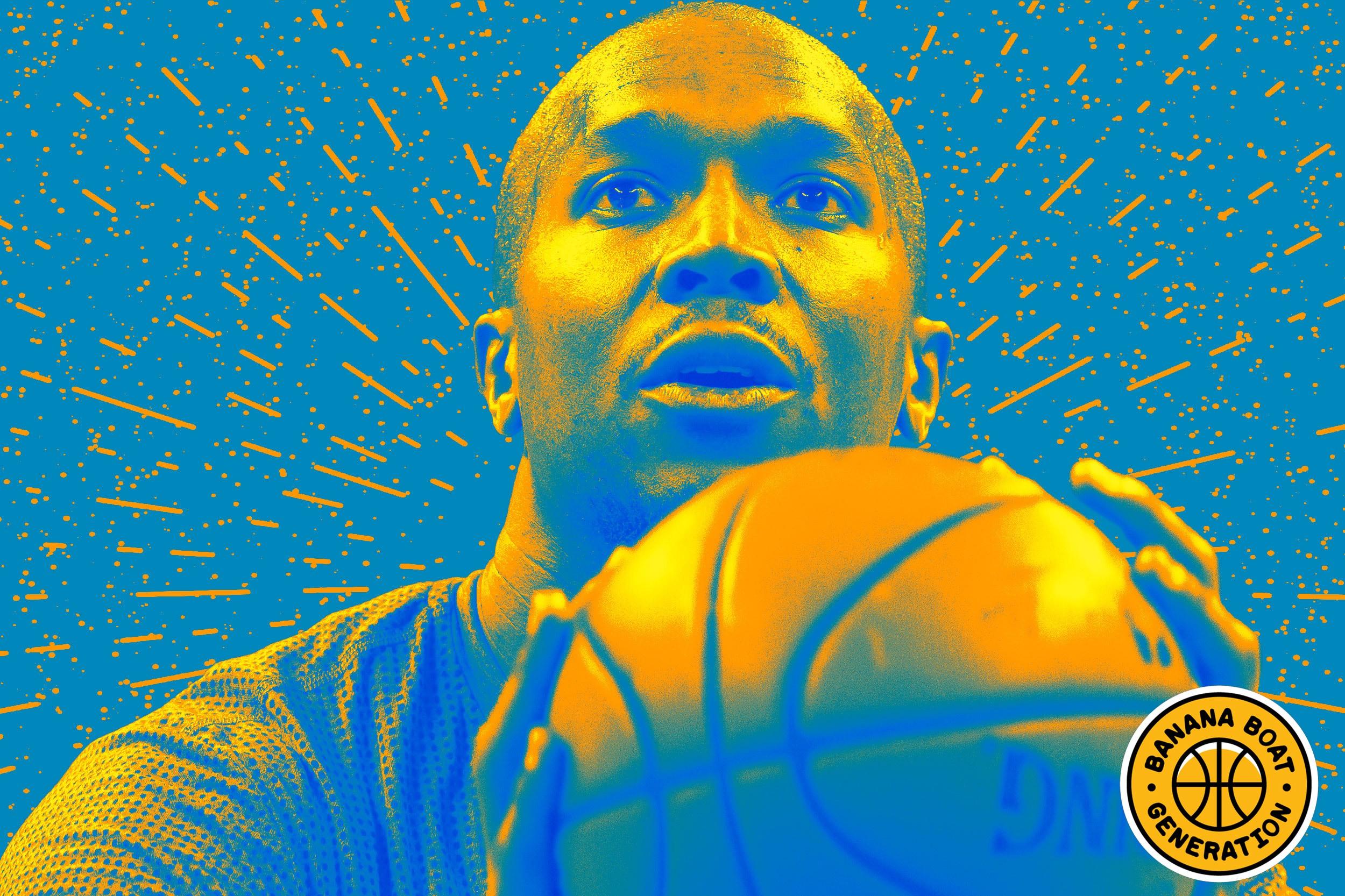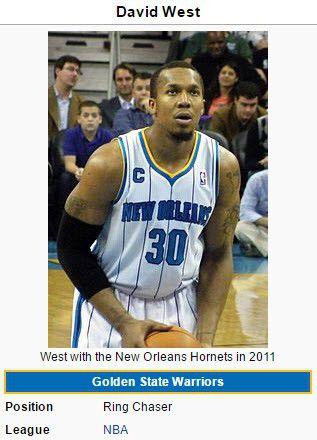Don’t Call Him a Ring Chaser
Or do, because David West doesn’t care about labels. Entering his 14th season, he cares about winning — and about learning from the game’s elite.
After a long summer of topless championship parades, free-agency meetings in the Hamptons, Snapchat mishaps, and gold medals, the NBA is finally, truly, really, almost back. The start of training camp marks the beginning of our NBA Preview.
This is Banana Boat Week. You remember the Banana Boat picture, right? That image of a floating basketball Mount Rushmore that featured LeBron James, Dwyane Wade, and Chris Paul (and Carmelo Anthony, if only in spirit). We’ll be looking at how that group of friends has shaped the modern NBA and what we might expect from them in these final seasons before they ride the waves into the sunset. We’ll also look at players who orbited their stars — the role players, outcasts, and busts who haven’t had quite the same impact on the game. Grab your life preserver. This should be fun.

David West did not expect to be here. Not here in Oakland, beginning the 2016–17 season with the Warriors. Not here on a minimum contract, his second in two years. In truth, the power forward didn’t even expect to be playing basketball at age 36.
“I had a plan,” West says. “Ten years. That was it. I was going to play 10 years in the league, try to accomplish whatever I could accomplish in that span, and then I was done. Period. No matter what.” Now here he is, sitting on the edge of the Warriors practice court, getting ready to begin Year 14. Two years ago, West told The Indianapolis Star that he never wanted to chase a ring. “I’m not going to be one of those guys that’s just out here chasing that,” he said. “I’m not going to be one of those guys out here sacrificing who I am, the things that make me me, to go out and get a material goal.”
The next summer, West opted out of his contract with Indiana, giving up more than $11 million to sign with the Spurs. That decision drew no scorn, only admiration: Here was a veteran pursuing team success over financial gain. But then a year later, he opted out of that deal, coming out to Oakland to join the Warriors’ superteam, and the optics changed. This was no longer admirable, the internet decided. This was desperate.
Unlike fans of other leagues, NBA enthusiasts tend to not begrudge players for pursuing money: Having fewer players leads to more of a connection between fans and individual athletes, less reverence for any shield or the grand lore of any team. We mock the teams that offer outrageous contracts, but we delight in the luck of the players who receive them. Get paid, Mike Conley. Take what’s yours, Solomon Hill. To Evan Turner ($70 million), Timofey Mozgov ($64 million), and Tyler Johnson ($50 million), we offer the words of Jalen Rose: Keep gettin’ them checks.
So what do we do with David West? What do we do with someone who sacrifices money in pursuit of something else? Someone whose decision would have been widely praised in decades past, a perfect adherent to values that feel antiquated today?
Well, on Wikipedia, someone changed West’s position to “ring chaser.”

On Twitter, the reaction appeared to be unanimous.
This was worse than selfishness. This was thirst. The pattern of veterans signing for diminished roles on elite teams has a long history in the NBA. Go back to Charles Barkley orchestrating a trade to join Hakeem’s Rockets, to Karl Malone latching on to the Shaq-and-Kobe Lakers, and more recently, to James Jones and Mike Miller earning a living (and rings) by being among LeBron James’s closest friends. West’s decision is nothing new. But given the $11 million pay cut he took last summer and the fact that it only took him 12 months to leave for an even stronger contender, it somehow felt more extreme. When asked about it, West pauses and grins. He looks up at the ceiling, lifts his hand to his bald head, shakes his head. “I’ve been trying to figure out the way to explain it,” he says. After a few moments of meandering talk, he settles on this: “Really,” he says, “it’s not just about winning a title.”

No — seriously. He means it. Now he leans forward, growing more animated as he talks. “We didn’t win a title last year in San Antonio, right? But I wouldn’t trade that experience for anything in the world.” For West, it all goes back to that 10-year plan. When West entered the league, his financial advisor counseled him to treat his $1.2 million rookie salary as if it were the only money he would earn from the league. He did the same thing for Year 2, Year 3, and every year since. More money was earned, of course, along with more success. West made two All-Star teams. He made the playoffs seven times, reaching the conference finals as the heart of a Pacers team that twice took LeBron’s Heat close to the brink. And by remaining responsible with his money, West hit the tail end of his career realizing he didn’t need more checks to live the life he wanted. “I made my money and I was smart with my money,” he says. “And so I hit the end of 10 years, and it’s like, ‘Wow. My body feels good. My mind feels good. I’m still having fun. And now maybe I can focus only on the things that matter to me.’ Because these years are just a bonus. It’s like a part of my career I never expected to have.”
So what matters? Winning, of course, but West insists it’s less about the chase of a title than about the experience of working with the game’s elite. “I value being around intelligent people,” he says. “I value being around people who work hard. You know? Critical thinkers. People who are interested in becoming better every day.” Winning is more fun than losing, yes, but West says it’s less about the wins themselves than about their effect on his quality of life, about taking with him experiences that will last deep into his retirement from the game.
He tells two stories. The first is about Tim Duncan. Last year, West says, the Spurs were scattered around a meeting room watching film. A video coordinator interrupted the session to point out a mistake that Duncan had made. “I turn around,” West says. “I mean, everyone turns around. We’re like, ‘Yo, that is Tim Duncan.’” He smiles. When he continues telling, he mock-whispers, “‘Man, shut the fuck up.’” Now his eyes go big. He holds his grin and continues. “But then Tim is like, ‘No, no, let him speak. If he has something that can help me, I want to hear it.’” West was stunned. “I’m like, this man is a Hall of Famer, one of the best players of all time. He’s spent 19 years in the league, and he’s sitting here taking advice from a video coordinator.”
He has another one. In the spring, days after the Spurs were eliminated by Oklahoma City in the second round of playoffs, Gregg Popovich addressed his players on their final day together as a team. With the players scattered around, Popovich walked to the whiteboard and wrote down a number of world events from the previous few days. Remembers West: “There’s a flood here, a natural disaster over there. Car bombs going off in some corner of the world over here. And then at the end of it, he writes down one more: ‘San Antonio loses in the playoffs.’ Something like that. And he says, ‘As hard as this might be, life is bigger than this. There’s a lot more to life than just our experiences.’”
These, West says, are the moments that make it worthwhile to pursue team success above all else, to keep surrounding himself with players and coaches who can teach him new things. “No matter what,” he says, “I can keep those stories with me. I’ll always have that. That’s the sort of thing that makes this fun for me.”
West grows excited when he talks about life after basketball. But rather than hastening his retirement, his off-court endeavors embolden him to focus only on the things that matter most to him within the game. He spent much of the offseason traveling with Zoetic Global, a renewable energy company whose board he sits on. He went to El Salvador and to Ghana as part of a team doing work around hydro-energy in rural areas. He remembers pulling out his phone in a remote village in Ghana and flipping through photos. He happened to have a photo of his new Warriors teammate, Draymond Green, one he uses as an illustration when working with young big men. “We’re in the middle of nowhere. There’s no cell phone reception, no TV, nothing. And I’m surrounded by all these kids, and they start yelling, ‘Draymond Green! Draymond Green!’ I’m like, How do y’all know who this dude is? It was just one of those moments that shows you the reach that this team has.”

And now he is here, getting ready for another season. Though no longer a fringe All-Star, West seems likely to be one of the leaders of the Warriors’ second unit. Coach Steve Kerr mentions him alongside Andre Iguodala and Shaun Livingston as players who will bring value off the bench, teaching teammates just as they teach him. Says Iguodala: “David West is really smart.” His teammates are well aware of the reasons he chose to join them. Says Green: “If you leave that much money on the table, you have one motive and one motive only.” In many ways, Green is right. West wants a ring. Badly. “Of course a championship is not guaranteed,” he says, “but just knowing that you’re going for a championship makes it exciting to come in here every day.” Yet his decision to join the Warriors isn’t only about the jewelry he might earn next June. “When you feel good about your life,” West says, “when you feel good about who you are, not just as a basketball player but also away from the game, all of this starts to feel like just a bonus. This is just fun.”
So let David West chase, if that’s what he’s doing. Let him enjoy 82 games alongside Kevin Durant and Stephen Curry, picking and popping his way through what may be his last year in the league. And if that year ends with him holding the trophy, let him enjoy it.
But even if it doesn’t, even if that thirst is never quenched, just know that West spent a decade ensuring that by this point in his life, he can play basketball for whatever reason he wants.

